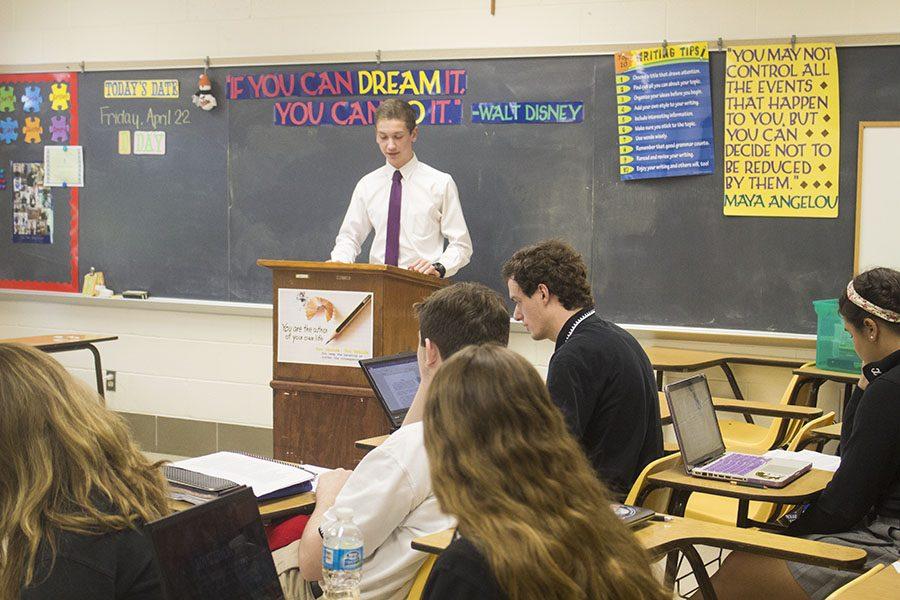Administration trims course offerings
Sophomore Evan Tridone gives a presentation on Buddy Holly in Allison Hall’s speech class. Speech is one of the classes that will be cut for the 2016-2017 academic year because it is not financially feasible according to President Richard O’Hara’s “rule of two.”
When looking at their schedules next year, some students noticed that their schedules did not include some classes they had enrolled in.
Next year, several classes will not be offered including Speech and AP US Government, according to President Richard O’Hara. According to O’Hara, these classes were not approved because they were not economically feasible.
Other classes viability for next year are still in question. Junior Ianna Pirozzi had signed up to take AP German, only to find out it had been cut. “I personally wasn’t that upset. I understand why since the school is based on tuition, and there just aren’t enough funds,” Pirozzi said.
According to Vice President of Academics Gary Scholl, no official list of classes that are being cut will be announced until scheduling with counselors is complete.
The Board of Trustees has issued new guidelines on classes, supported by O’Hara. According to these new directives, every department has to have an average class size of 18-21 students. Any individual classes less than 15 or greater than 23 have to receive specific approval from O’Hara and the finance committee.
So far, there have been 19 classes with fewer than 15 students and 2 classes with greater than 23 students that have been approved.
According to the Chief Financial Officer Kathy Cullen, these classes that are not offered next year are not gone for good. “It’s a rotation philosophy. Just because one year a class won’t be held doesn’t mean it won’t come back,” Cullen said.
The decision to re-evaluate classes based on class sizes was based on “the rule of two,” according to O’Hara. “Everybody wants three things: low tuition, high salaries, and small class sizes. But you can only do two,” he said.
When compared to the other similar, independent schools in Maryland (AIMS), JC’s tuition is in the 10-20 percentile, meaning that at least 80 percent of other comparable independent schools in Maryland charge a higher tuition. However, according to Cullen, despite having one of the lowest tuitions, JC’s salaries are in the 80 percentile.
Next year, the school’s tuition will be $16,500. However, according to both O’Hara and Cullen, increasing tuition greatly to bridge the gap is not an option. “We don’t want salaries to come down and we can’t up tuition, so we have to look at everything [we] offer and [realize that we] can’t spend resources unnecessarily,” Cullen said.
According to O’Hara, the school is dedicated to giving people raises, particularly the “best teachers.” Teacher salaries rely on a performance-based model that takes into account student reactions and surveys, dedication to improvement, and classroom evaluations.
“We want to reward the best teacher and develop the others. However, we are so reliant on tuition that this probably won’t happen,” O’Hara said.
Aside from not offering certain classes next year, the school is also not replacing a majority of teachers that are leaving. “If that teacher’s role can be absorbed by other members of the department without going outside the [class] guidelines [set by the board]. However, if all the classes would be large, you’d have to hire somebody,” O’Hara said.
For example, next year science teacher Timothy Perry is retiring, and according to O’Hara, a replacement will not be hired. However, German teacher Richard Moller will be replaced because his position could not be absorbed within the current department.
While the annual budget is tied to many aspects of the school, one thing that remains separate is the Capital Campaign. According to O’Hara, for the next phase of the Campaign, the school will be hiring an outside firm to do “a lot of the leg work of interviewing people and organizing.” The firm is only temporary, however, and will be paid from campaign money rather than coming out of the budget.
According to O’Hara, the next phase will be centered around the renovation of the academic wing, which is estimated to cost about $7-8 million. This phase has not started yet but will “most likely” begin next year.
Classes come and go, so the classes that could be in these new classrooms of the academic wing in a few years could be completely different than now. However, according to O’Hara, the school is committed to offering a strong academic curriculum.
Claire Grunewald is the Print Chief for The Patriot and jcpatriot.com.



